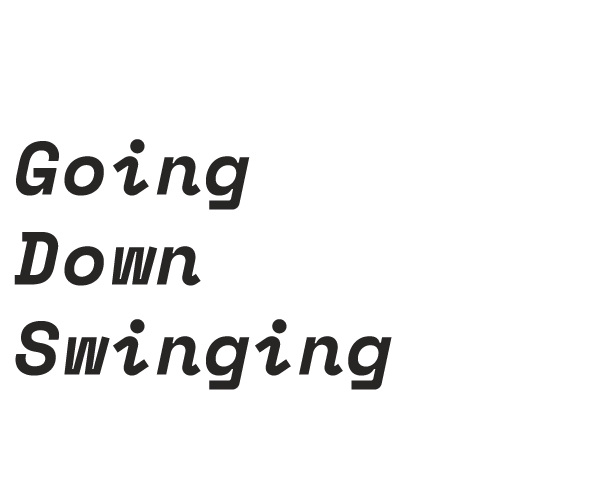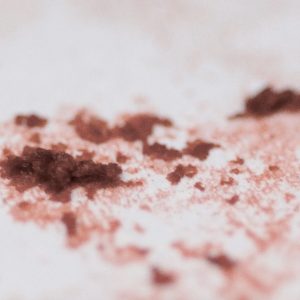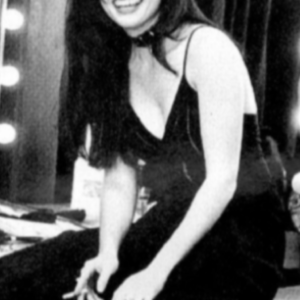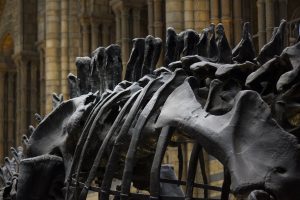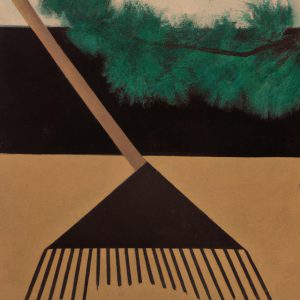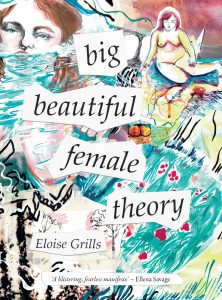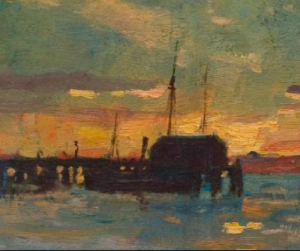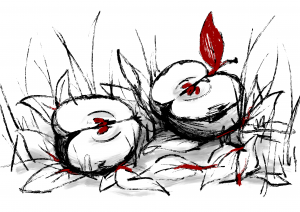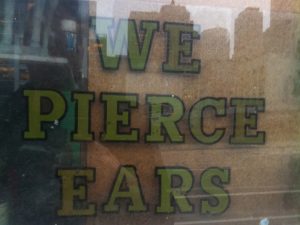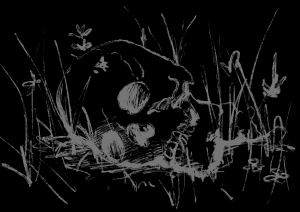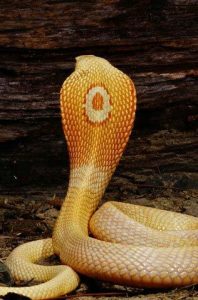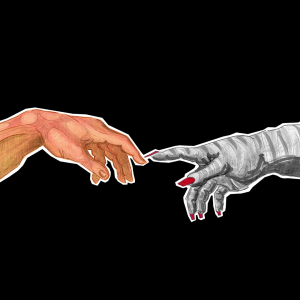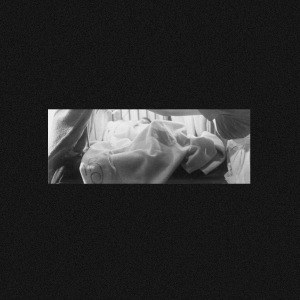Dominic was dead.
…
Freddie heard the announcement on the morning news while washing dishes between sips of condensed-milk tea. Even though he had foreseen Dominic’s passing, the news of his brother’s death still hit him like a one-punch assault.
…
Outside, on Glenwood Avenue in Glen Waverly, cars slowed at the traffic lights. The resident magpie mined for worms in the overrun backyard and the decaying bird’s nest hung lopsided in the banksia tree like a cancer mass. Everything existed just as it did two minutes ago, except for Freddie Fonseka. He had the languid movements of a fly drowning in a jar of honey. Freddie hauled a dining chair and positioned it within inches of the TV screen. He sat down and turned up the volume so that the sound thumped inside his chest. The ABC news showed the security video of his brother Dominic in an almost empty train carriage on the Glen Waverley train line. It was like watching a replay of his vision from two months ago.
In the news footage, Dom was wearing his awful grey suit—the one he wore to work. Pants too long in the legs, hanging hopelessly over his shoes, and the jacket pinched across his broad shoulders. He seemed calm, head downcast as always, standing with his back to the doors as they closed.
…
Freddie watched the final moments of Dominic’s life. The recording was black and white, grainy and sped up, making Dom look like a character out of a Charlie Chaplin film. His movements were rendered jerky as he walked, sat down, scanned his phone, and then stood up again to leave. Dominic’s bald patch on the crown of his head gleamed in the artificial light, and his chin stuck out—a bit like an ape. His brother would not have liked all this publicity.
Freddie sighed; the air fled his lungs. He didn’t want to think about what happened when Dom left the train. He’d already seen it.
Just as the newsreader asked anyone who recognised the man in the footage to call the police, the phone rang. Bloody Dominic and his insistence on maintaining a landline. The brothers had a rule that Freddie would at no time answer the home telephone owing to his ‘unlawful’ status. Yet, inexplicably he picked up the phone.
“Hello, Detective Constable John Sorensen…”
Freddie hung up swiftly, so fast that the call might not have occurred.
…
He turned off the TV, returned to the sink full of dirty dishes and peered out of the window above the washbasin. It was threatening to rain, but the magpie was still strutting around in the garden, its black and white chest shoved out. Freddie watched the theatrical creature, marvelling at how nature and this ugly bird carried on with their business despite his loss. He wished he had his childhood slingshot; he’d hit the creature over for six.
The magpie stopped swaggering, quite suddenly, and cocked its head to the side. It turned its chestnut gaze onto Freddie and launched into a full-throated warble. The notes were warm and mellifluous. And, just for a moment, Freddie felt hopeful.
“It’s a sign—” Freddie whispered, his breath misting the glass.
…
He had always believed in signs. Just as the air became dense before a monsoon, Freddie experienced premonitions. As he grew older, these signs mutated, expanding into visions. Whenever Freddie touched another person an explosion of their entire life played in his head. He discovered that if he held on to someone’s hand for long enough, he’d see snippets of their future too. Freddie’s visions had included his mother’s death to tuberculosis, his father’s affair with the maid and their spinster Aunt Lily finding love with a Haitian refugee in LA. Curiously, Freddie couldn’t ascertain his own fate. His future lingered like a haze whenever he reached for it, never materialising into images.
…
Dominic passed as white. He’d inherited the fair skin, auburn hair and pale eyes of his Burgher ancestors. In misguided assimilation attempts, Dom had acquired a taste for Bunnings’ sausage sizzles, the Australian cricket team and the North Melbourne footy club. However, when Dom opened his mouth, any bloody fool knew from his accent that he was not an Aussie.
Freddie resided at the other end of the spectrum, with his teak-coloured skin and thick black hair characteristic of Southern Asians. And he would never swap a curry for a sausage.
…
None of this bullshit mattered now. Dominic was dead.
…
They had been at a pre-Christmas party hosted by one of Dominic’s work colleagues. At the smorgasbord table, the woman had hovered near the sausages, temporarily causing a bottleneck in the buffet line. Freddie watched as she made a slow circuit of the table returning to the now diminished plate of sausages.
The first thing that Freddie noticed about the woman was her eyes—large, rust-coloured and tragic, like a doe. She wore purple pin-striped pedal-pushers and a close-fitting linen shirt that accentuated her breasts and highlighted her milk-tea skin. It wasn’t easy to discern whether the woman was an Australian or a foreigner like him. Perhaps she was mixed. Almost certainly she legally resided in Australia, unlike Freddie. He could tell from her easy-going manner. Freddie thought she looked like someone who could be trusted.
All he needed was a little touch, and he’d know most things about her. Freddie seized a plate and headed to the table.
“I’m wondering if those are chicken sausages. I don’t eat beef or pork, but I eat bacon,” he blurted to the woman. She gazed at him and smiled, a row of perfect teeth.
“Me too. I never touch pork. But I love bacon!” she said, in an unmistakable Sri Lankan accent. She held out her hand. “Hi, I’m Shanthi.”
“Pleased to meet you! I’m Freddie, brother of Dominic, over there in the corner.” He pointed to his brother, a plate of food on his lap, seated alone and looking out of place.
As he took Shanthi’s hand, her past wafted up between his eyes. “You have a younger brother, isn’t that so? And your mother passed away when you were quite young?”
He heard a small gasp as Shanthi’s eyes met his, and she pulled her hand out of his grasp. Her eyelids fluttered, as if trying to squash the memories, and she took a small step backwards.
“I am so sorry. I can’t help it. I’m a fortune-teller.” Freddie said as he put his hands together and bowed his head, genuinely regretful.
Shanthi broke her extended silence. “I must introduce you to my friend, Claire. She’s obsessed with that sort of thing,” said Shanthi, beckoning to a woman with an asymmetrical face, who was in the process of shoving a fistful of crisps in her mouth.
“Claire, Freddie here is a fortune teller.”
“Really?” Claire said in a somewhat uncouth Australian accent, craning to take in Freddie. She had remnant crisps stuck in the corners of her mouth and sweat pooling on her upper lip.
“I’d be interested in what you have to say about me! How much do you charge for a reading, Freddie?” asked Claire as she attempted to lick and dislodge the food from her lips.
Freddie could only think in Sri Lankan rupees. He did a quick calculation in his head. Of course, he’d be able to charge more in Australia than he did back home.
“Is $50 okay? I can do a preliminary reading here. For free. You can decide afterwards if you’d like a full reading.”
“That sounds alright. Let’s see how good you really are,” Claire spoke, deliberately. It felt as if she was trapping him.
“Shall we sit down?” he said, gesturing to several vacant chairs lined against the wall. “I prefer to hold a client’s hands. Is this okay with you, Claire?”
Claire nodded and held out her hands.
“Is there anything in particular you’d like to know?”
“You can start by telling me about my family background,” said Claire with a secretive smile.
To appear authentic, Freddie closed his eyes as he held the woman’s hands, still oily from the crisps. Claire’s past uncoiled inside Freddie’s head.
“You grew up in the country; I can’t pronounce the town’s name correctly, maybe an Aboriginal sounding name, no? You have a younger brother, and your father died a few years back. I can also see something that looks like…an elephant? A mountain perhaps?” Freddie opened his eyes. Claire was staring at him, her face white, like the flesh of a king coconut.
“You’re kidding me! Shanthi, you set this bloke up, right?”
“Nooo, it’s not a joke! I just met him at the buffet table.” Shanthi paused. “And I didn’t know when your father passed away.”
…
The three of them sat in silence. Freddie thought about what he’d seen when he held each woman’s hand. There was much more happiness in Claire’s life than there had been in Shanthi’s. Yet, Claire had become a gloomy, half-full character. Entitled and very much like a child, thought Freddie. Shanthi’s life had been pitiful, like her eyes. And her death would be more tragic still. Some people attracted misfortune, he figured. The initial intrigue he had for Shanthi faded.
“I’m not sure how you do it, Freddie, but you have quite a remarkable gift,” said Claire.
“Yes, a real talent you have there,” agreed Shanthi nodding her head. “I thought you told me you read fortunes so that you could hold my hand,” she laughed. “But, unlike Claire, I don’t want you to predict my future. I will take life as it comes. I have no desire to know what lies ahead for me.” Freddie thought that her approach was probably a good thing, given what he had seen in store for Shanthi.
A small crowd had gathered around the trio, as a result of Claire’s announcement to the party that they had a “fair dinkum clairvoyant” in their midst.
Freddie felt intoxicated by all the attention. He soon had a list of clients that would earn him at least $500. Dominic remained quietly ensconced in his corner, looking more like an image than a real man.
…
“You’re a fool,” said Dominic as soon as they were in the car.
“What?”
“For God’s sake Freddie! You’re the brown man, who tells fortunes. You may as well wear a turban and carry around a genie lamp,” spat Dominic without looking at Freddie. The feeling of intoxication Freddie had carried from the party evaporated.
He was quiet as he shifted in the passenger seat to observe his brother’s profile at the steering wheel. Here was a man with little joy in his life. Dominic had placed restraints on himself and altered his identity to fit in with the suthas; his brother merely existed. The thought depressed Freddie.
“What’s your problem, Dom?”
Dominic remained silent for several seconds. He exhaled heavily. “I know I’m a loser.” Dom turned. His sea-green eyes met Freddie’s, his gaze desolate, even in the darkness of the car.
…
“For God’s sake Freddie! You’re the brown man, who tells fortunes. You may as well wear a turban and carry around a genie lamp”
It had not been a deliberate decision to overstay his visitor’s visa—that’s what he told Dominic.
“What harm am I doing by being here? I haven’t taken someone’s job. Actually, I’m helping the Aussies with my readings.”
By Christmas, six months had passed. Freddie was no longer an over-stayer. He was an unlawful citizen. There was no going back to anywhere, except a detention centre.
…
On Australia Day Freddie had hosted a lunch with the promise of free readings, a curry buffet and arak cocktails. He’d invited a few key clients and a Sri Lankan psychiatrist and his wife he had met while out shopping for spices in Clayton.
In the same way a tourist gazed at an unknown metropolis, Freddie observed the gestures and demeanours of his guests. He noticed the violaceous half-moons under Dr Senadipathy’s eyes, and Mrs Senadipathy’s bitten fingernails with traces of red nail polish. He observed Dom’s habit of resting his nose on his bent left index finger when he was contemplating, and the way that crisp-eating Claire picked at a scab on her right arm whenever she spoke. They were all signs.
“It’s your turn for a reading, Dominic,” Mrs Senadipathy declared abruptly. “How lucky you are to have a brother with such talents as Freddie. You have predictions on tap, no?”
“Actually, I haven’t read Dom’s palm for years,” said Freddie, taken aback by the woman’s impertinence.
The arak cocktails made Dominic compliant. He sat opposite Freddie and thrust his hands into Freddie’s lap, unfurling them like lotus blossoms. “Come on then. Get on with it.”
“Are you sure, Dom?” it seemed the decent thing to do, to clarify his brother’s permission.
Dominic nodded, egged on by the arak.
Freddie felt a prickle on his skin as he took Dom’s hands in his. An unease possessed him. The ferocity of the vision slammed into his chest, winding him. Freddie paused to even out his breathing, then released Dom’s hands. He cracked his knuckles and adjusted the collar on his polo shirt.
“Nothing revelatory here!”
…
Later, when the guests had left, Freddie followed Dominic into the kitchen.
“I need to talk to you.”
“Hmm…Yes?” Dom said slowly while soaping the plates at the sink.
Freddie knew that he needed to articulate his words carefully.
“Don’t take this the wrong way. I feel a responsibility to tell you…what I saw…when I held your palm. I didn’t want to say it in front of everyone.”
“Umm. But I don’t believe in…” Dom trailed off.
Freddie paused. His brother didn’t believe in much. Dominic barely believed in himself. But Freddie persisted
“You have a terrible accident on the Glen Waverly line. Can you use another train line or drive to work, just for a few weeks?”
Freddie watched the back of Dominic’s prematurely balding head, but his brother did not turn around.
“Don’t you have anything to say?”
Dominic breathed in and out wearily. “What do you want me to say? Do you want me to admit that the universe has sent a sign?”
“Dom! You’re going to die! Can you stop using the Glen Waverley line?”
“If your vision, or whatever you want to call it, is correct, then it’s my karma—I’ve been slotted to die. It’s not as if the universe cares whether I change my routine or not!”
…
If people told themselves enough lies, they failed to recognise the truth. And like a shrink, Freddie helped people sift out the truths from their fiction. Yet, what comfort had there been in Dominic knowing the truth? Freddie had merely burdened Dom with his Australia Day revelation. And now, two months later, Dom was dead. The truth hadn’t changed anything.
He remembered Shanthi from the Christmas party. Hers would be a frightening demise—trapped inside a paralysed body, only able to move her eyes. Shanthi had been right in not wanting to know. Freddie regretted telling Dom. Who in their right mind would want to know that they’d be crushed to death by a bloody train?
…
The security that Dominic provided to Freddie with his sheer existence in the world had vanished. He had been dependent on his brother the way people are reliant on their mobile phones—a comforting weight in their pocket, even when not being used. Freddie stood alone in the world now. His loneliness was so thick he could touch it. And the house was quiet, like a still-life painting; it unnerved him. Even the act of standing at the kitchen sink seemed out of place and wrong, somehow.
Freddie wondered if Dom’s dead body had reached the morgue. He forced the thought away and stared out of the window, allowing his gaze to land on the magpie; now silent yet intensely present and still rummaging around in the garden. Tilting his head, Freddie was astonished to notice the magnificence of the bird with its robust chest and intelligent eyes. Freddie felt the urge to join the magpie and stumbled out the backdoor to the garden. The air smelled of damp autumn leaves and felt crisp on his bare arms. The bird, unperturbed, by his arrival strutted towards the banksia tree. Freddie’s eyes were drawn to a cluster of yellow daisies where the magpie had been. He glanced back between the flowers and the bird.
“You’re here to remind me—I owe a duty to Dom… Australians don’t know any of our traditions,” Freddie nodded slowly in acknowledgement, then bent down to pull the daisies out of the ground. He searched unsuccessfully for more flowers. Unlike the tropical gardens of Sri Lanka, there was nothing beautiful in the bleak and soulless Melbourne suburbs. Still, some of Freddie’s despondency had disappeared. Back inside, he arranged the daisies on a plate with a selection of cut-up fruit and Dom’s favourite sweet, love-cake. He placed the offerings at the family altar together with Dom’s passport, opened like a sorry-for your-loss card; the only photograph he could find of his brother. Then Freddie lit a candle and an incense stick and chanted the Seth pirith.
…
Australians treated death differently to Asians. There were no rites to prevent the departed from becoming hungry ghosts. Concern began to plague Freddie. In six days, he needed to engage a monk to conduct a bana to gain merit for Dominic’s soul. Ordinarily, a body was cremated before the bana so that a spirit knew it was dead. Yet, Dom’s damaged corpse would languish in a freezer drawer beyond the optimal time for cremation. Unless Freddie identified and claimed the body, it would eventually be buried like rubbish, in an unmarked grave.
…
The landline sounded again. Insistent.
Each successive ring felt like a noose tightening around his neck.
…
Freddie had the urge to snatch the phone and tell the caller to fuck off. Alternatively, he could pull the cord out of the socket, and find his way to the mortuary where Dom’s body lay. Or, he could just walk out and not return to Glenwood Avenue or Sri Lanka or anywhere.
Freddie kneeled at the altar. He closed his eyes and brought his palms together. “Tell me what to do,” he whispered to the inert pictures of his parents and to Dominic’s passport. The haze which prevented Freddie from visualising his destiny lifted, allowing his future to unravel. For the first time, he imagined the world as it was meant to be perceived—no gaps, only a glistening straight line to the future.
